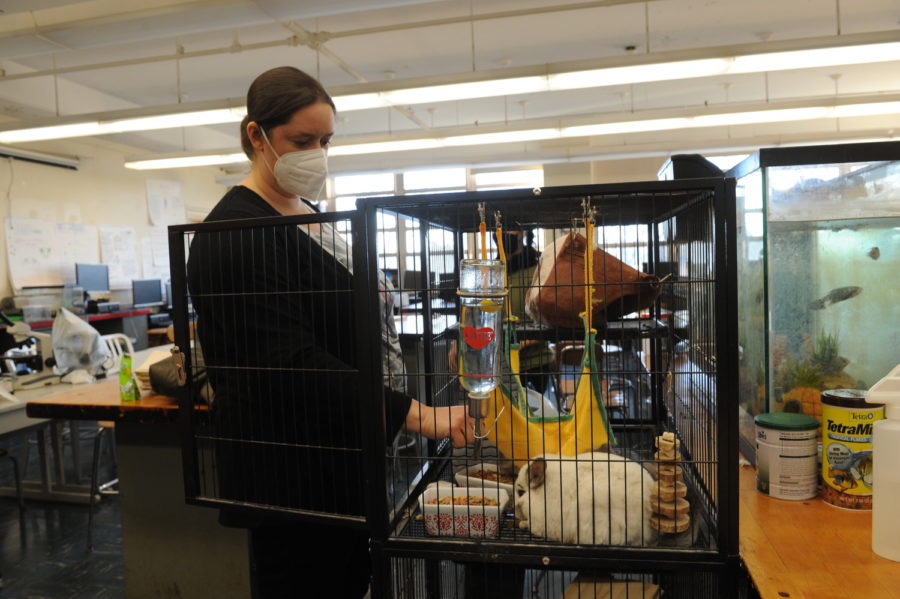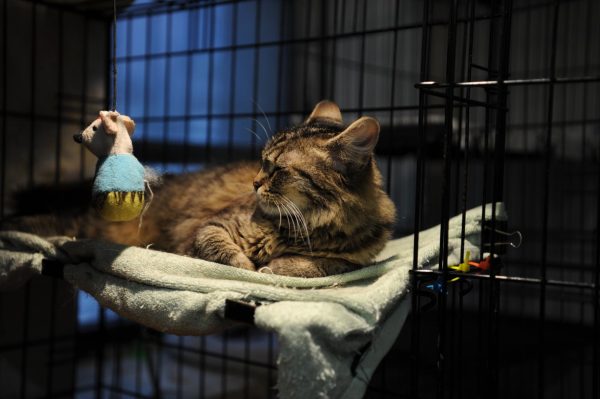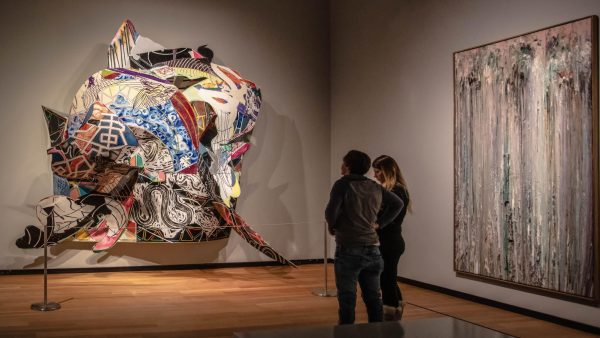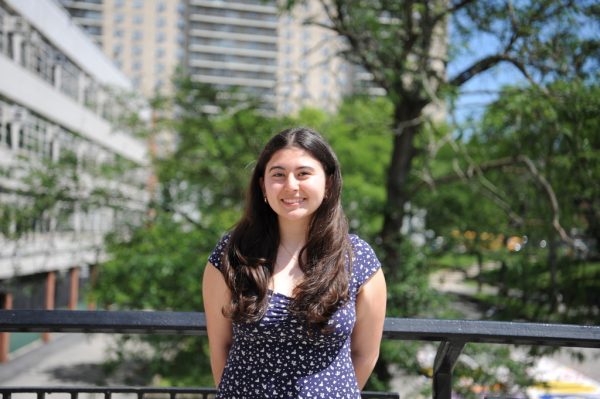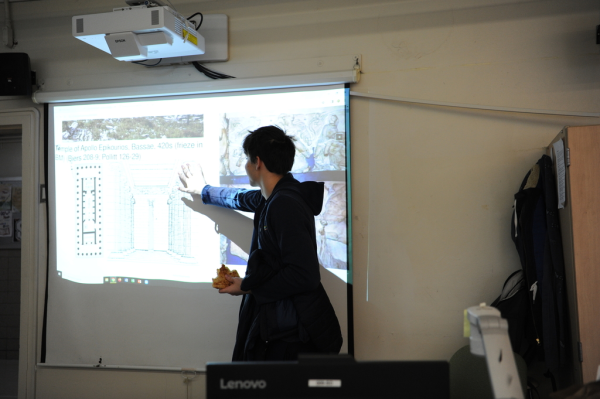Finding the Beauty of Animals, Science, and Learning: A Profile on Dr. Schmidt, a Bronx Science Biology Teacher
In her Animal Behavior and AP Biology class, Dr. Schmidt’s approach to learning and teaching makes students eager to learn.
Dr. Schmidt said she has been greatly influenced by her colleagues. “I have spent a lot of time observing and conversing with people in my department and other departments. I’ve had a lot of conversations about how to care more about learning and the learning process instead of just grades. I just want my kids to be happy and learning.”
As I walked into Room 333 at Bronx Science to interview Dr. Schmidt, I found her surrounded by students from her Advanced Placement Biology class. Each student was waiting to ask her a question for their upcoming AP exam. On the dry erase board there were scribbled notes about cell division and statistics from a productive SGI session (Small Group Instruction, which is individualized tutoring offered by all teachers at Bronx Science). Once the bell rang, students promptly filed out as Dr. Schmidt began to instruct the Bronx Science Animal Squad about retrieving the animals from their respective locations for their daily care session.
In the span of 10 minutes, I got to see a quick snippet of Dr. Schmidt’s daily schedule. Dr. Emily Schmidt is a scientist and biology teacher at Bronx Science with a plethora of other responsibilities ranging from running the Bronx Science Animal Squad to working on the school musical. She has been teaching Animal behavior classes, AP Biology, and the junior and senior biology research classes at Bronx Science for the past seven years.
“Dr. Schmidt is one of the sweetest and most inspiring teachers I’ve ever had. She also really loves what she does and I think all of her students can attest to that,” said Arianne Browne ’22. “She loves animals and she turned that passion into a profession by teaching her students all about them and about biology in general.”
Animal Behavior is a unique elective at Bronx Science that gives students the opportunity to learn more about the biological behaviors and habits of animals. Students learn about the ecological impacts, mechanisms, and adaptations of species. Towards the end of the year, students take trips to the Bronx Zoo to observe animals in person. For students like Demitris Salas ’22, it’s one of their favorite parts of the class.
Dr. Schmidt said, “I really enjoy teaching the class because it’s an elective so I have a lot of choices in it. I don’t have a test I have to prepare my kids for so if there is something my kids really like, I can spend more time on that lesson.”
Dr. Schmidt gives students the opportunity to complete projects on topics they are interested in. For these projects, students are given the choice between writing a research paper or presenting the assignment in a creative way such as a poster or comic strip.
Given Dr. Schmidt’s background as a researcher, it’s also no surprise she teaches Biology Research. Dr. Schmdit said, “In the 4th year of my Ph.D. I realized I really enjoyed mentoring and teaching. It lets me apply what I learned doing research on my own in a new way.”
However, her work as a teacher has not stopped Dr. Schmidt from field research. During her time at Bronx Science, Dr. Schmidt has worked to set up bat recorders on the roof of the school building collecting data that students have used for their Regeneron projects. This summer, Dr. Schmidt will engage in field research on a riverboat in Peru, working on a wildlife conservation project with Earthwatch.
“I wrote an 8-page fellowship proposal. My two main themes were about what science is – specifically how it’s not just working in a lab, but also field biology, and about broadening the prospects of science to fight climate change in a different way,” Dr. Schmidt explained. She will be working with Indigenous people and other scientists and hopes to put together a case study about biodiversity and addressing climate change.
Dr. Schmidt also teaches AP Biology. Despite the packed curriculum, Dr. Schmidt said it was one of her favorite classes to teach. She said, “I really like the kids. That’s why I teach. I like the curriculum, even though it’s crazy. There’s so much to cover, but we have two periods so I get to know the students better.”
Her AP Biology classes are full of case studies, questions and practice to help her students not just learn, but truly understand the complexities of biological concepts.
Barshan Bhunia ’24 said, “I really like Dr. Schmidt’s teaching style because she gives you lessons and work. It lets you implement and apply the things you learn during class to do both personal, group, and individual work.”
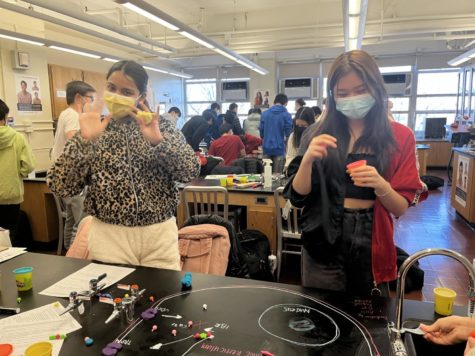
One way Dr. Schmidt helps her students understand concepts is through the use of case studies. During their ecology unit, Dr. Schmidt taught the lesson through the example of Pablo Escobar’s hippos in Puerto Triunfo, Colombia, highlighting how the hippos are reshaping the ecosystem of the nearby area.
Dr. Schmidt said, “Case studies definitely make the class more engaging and students get to have fun while learning. There’s also this push for teaching and not learning facts in isolation, and instead of just knowing the structure, also asking questions like ‘how does knowing the structure help?’ Case studies let students put multiple concepts together.”
Dr. Schmidt has also taught lessons about Race and Biology in her AP Biology class, specifically regarding the lack of scientific reason behind the concept of race. Despite the busy AP Curriculum, during the genetics unit, Dr. Schmidt spent a week teaching lessons about skin color and how it’s an evolutionary response to sun exposure, while also incorporating labs about genetic similarities and differences.
Dr. Schmid: “The lessons are from a workshop that I did with Math for America. After everything that happened with George Floyd last year, we started talking about what we can do. I started attending meetings that Ms. Coombs was running, which just made it clear how apparent the problems were. A lot of teachers were talking about it over Zoom about how we could help, especially as Caucasian teachers. So when I saw the course list, I signed up for it, and over the course of four weeks, I worked with a bunch of biology teachers to talk about how to implement these conversations and address the misconceptions regarding race and biology and how to have respectful discussions.”
These lessons have helped address issues regarding misconceptions about genetics and race and helped students learn that while racism is very real, the concept of race is purely a social construct.
Eliza Phua ’24 said, “While I knew that race was a social construct prior to these lessons, I didn’t really know much about science. Learning about it in biology in Dr. Schmidt’s class helped put things into perspective and I think it’s something everyone could benefit from.”
Dr. Schmidt creates a safe and enriching classroom environment where students are constantly exposed to information that not only helps them better understand the world of biology but also the world around them.
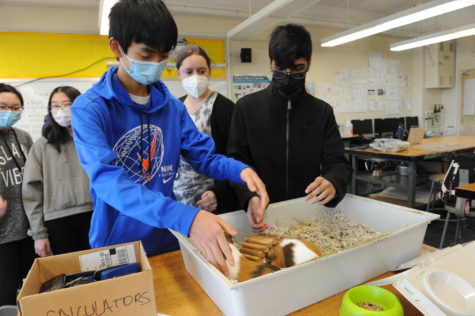
“Science is fun, and learning is fun. I think students often get swept up in grades, so it is important to sometimes slow down and create a classroom where students aren’t scared of making mistakes. Grades are important, but sometimes you might just have a bad day. But as long as you’re learning, you’re good,” said Dr. Schmidt.
Outside of the classroom, Dr. Schmidt also helped to organize the school musical. This academic year, after months of hard work from both cast, crew, and the faculty, The Atomic Theater Company did a production of Godspell at Bronx Science.
“When I was your age, I thought I would win an EGOT [The achievement of having won an Emmy, an Oscar, a Tony, and a Grammy], and I didn’t want to go into science until the summer after my junior year,” Dr. Schmidt said, with a laugh. “Working on the school musical brings me joy, and it’s a really fun way to express the creative and artsy side.”
Despite her busy schedule, Dr. Schmidt hopes to work on the musical again next year.
Dr. Schmidt walks the line between art and science, emphasizing the need for both logic and creativity. By assigning creative projects inside the classroom to explain complicated scientific concepts and through her involvement in the school musical, Dr. Schmidt proves that art and science are not mutually exclusive.
Yoyo Zheng ’24, a student from Dr. Schmidt’s AP Biology class said, “I like that in her class I get to not only learn science but also express myself through the creative projects. I think, ultimately, it only helps make my understanding of biology better because I can learn it in a way that makes sense for me.”
“Science is fun, and learning is fun. I think students often get swept up in grades, so it is important to sometimes slow down and create a classroom where students aren’t scared of making mistakes. Grades are important, but sometimes you might just have a bad day. But as long as you’re learning, you’re good,” said Dr. Schmidt.
Ayshi Sen is an Editor-in-Chief for ‘The Science Survey.' Ayshi loves writing journalistic articles because they allow her to write in a way that is...
Charlotte Zhou is an Editor-in-Chief for ‘The Science Survey.’ In addition to writing and editing articles, she constructs the online crossword and...

